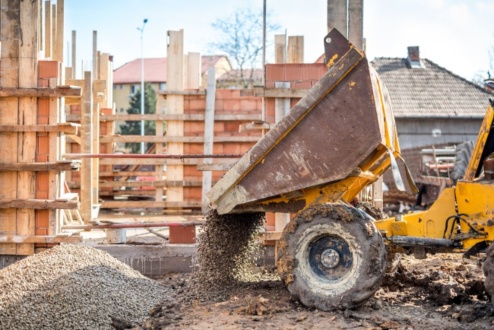Aggregates are the unsung heroes of the construction industry, forming the foundation for countless structures and surfaces. In this article, we’ll discuss the various aspects of aggregates, highlighting their importance, types, and uses, as well as the role of aggregate companies in the construction industry.
What Are Aggregates?
Aggregates include a wide range of coarse to medium-grained particulate materials used in construction. This category includes sand, gravel, crushed stone, slag, fly ash, recycled concrete, and synthetic aggregates. They are the most mined materials worldwide, sourced predominantly from natural environments like pits or quarries.
The Role of Aggregates in Construction
Aggregates are the backbone of various structures, including roads, bridges, buildings, and more. They are vital to the composition of asphalt pavement, making up over 90% of its makeup, and up to 80% of a typical concrete mix. Enormous volumes of aggregates are required for many projects. For example, one mile of Interstate highway requires about 38,000 tons of aggregates.
Types of Aggregates
There are several types of aggregates, each selected and processed to meet specific construction needs. These include:
- Gravel – Often used in road construction and as a component in concrete.
- Sand – A key element in concrete mixes and asphalt.
- Crushed Stone – Used for various construction applications, including as a base material for roads.
- Slag – A byproduct of metal smelting, used in concrete and asphalt mixes.
- Recycled Concrete – An eco-friendly option, using concrete from demolished structures.
- Synthetic Aggregates – Synthetic materials used in geotechnical engineering.
Aggregates in Concrete and Asphalt
When mixed with binding mechanisms like cement or asphalt, aggregates create durable materials such as asphalt concrete and Portland cement concrete. These blends are essential for constructing solid, long-lasting surfaces and structures.
Versatility in Applications
Aggregates are used in a wide range of construction projects, including highways, walkways, parking, lots, airport runways, and railways, just to name a few. They are the key ingredient in the manufacture of concrete, mortar, and other construction materials.
Sand and Gravel Companies
Companies specializing in sand and gravel are an important part of the construction industry. They provide essential materials needed for various construction projects. These companies manage the extraction, processing, and distribution of natural aggregates, ensuring a steady supply to the market.
Concrete Mix and Aggregate Companies
Concrete mix heavily depends on aggregates for its structural integrity. Aggregate companies provide these components to provide the right mix for different concrete types. They play an important role in quality control, ensuring that the aggregates meet the necessary standards for size, shape, and durability.
Importance in Road Construction
Road construction is one of the primary areas where aggregates are used. They provide the necessary foundation and stability for durable and safe roadways. Road construction includes multiple stages, from laying the base layer to the final asphalt paving, each requiring specific types of aggregates.
Economic and Environmental Aspects
The economic impact of aggregate production and use is significant. Aggregate production creates jobs, fuels the economy, and is vital for infrastructure development. Environmentally, the industry faces challenges like resource depletion and environmental impacts. As a result, sustainable practices like recycling concrete and using synthetic aggregates are becoming increasingly important.
Future Trends
The future of aggregates in construction involves innovations in recycling and sustainable sourcing. With increasing environmental awareness, the industry is exploring more eco-friendly options like using recycled materials and developing more efficient extraction and processing methods.
Challenges and Opportunities
The aggregate industry faces challenges such as regulatory issues, resource management, and environmental concerns. However, these challenges present opportunities for innovation, particularly in sustainability and efficiency.
Aggregates are indispensable in the construction industry, offering a unique combination of versatility, availability, and variety. From forming the base of our roads to being a primary component in our buildings, their importance cannot be overstated. As the industry evolves, the focus on sustainable and efficient practices will likely continue to increase, so that aggregates can continue to play a vital role in construction in the future. Aggregates are more than just rocks or sand; they are the building blocks of our modern world, playing a critical role in shaping our built environment.
For more information about the products and services that Brannan Companies provides, contact us via our website or give us a call at 303-534-1231.

